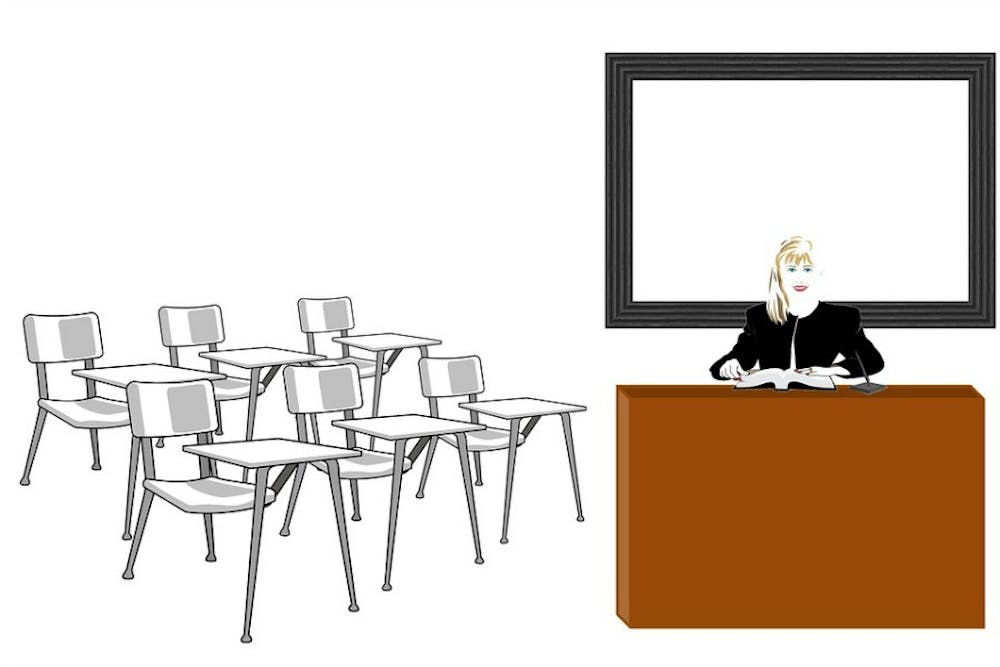By Megan Zahneis, News Editor
One year ago today, a group of 200 Miami faculty members gathered in Upham 001, on the verge of change.
They were there to hear a speech by Rudy Fichtenbaum, president of the American Association of University Professors (AAUP), and to bring into existence Miami's own AAUP Advocacy Chapter.
Today, that fledgling organization is not only the newest, but the largest advocacy chapter in AAUP's Ohio Conference. It now boasts 97 due-paying members, among them University Distinguished Professors, adjunct faculty, department chairs, lecturers, visiting assistant professors, graduate students, emeriti, and many tenure-line and tenured professors. The chapter's concerned faculty satellite consists of nearly 300 members.
Members organize via a Facebook group, an email listserv and a variety of meetings and events held throughout the semester, all of which are orchestrated by a four-person executive board and a 12-member advisory council whose members are spread across Miami's campuses and disciplines.
At a recent end-of-year meeting and social, chapter leadership praised what they said was a productive first year.
At the year-end gathering, outgoing chapter president Keith Tuma said the dialogue AAUP has created with university administration was a chief accomplishment.
Other items on the AAUP's docket included the publication of several working papers on Miami spending and health benefits, hosting "Lunchtime Chats" for faculty members to discuss governance and healthcare, advocating for contingent faculty members and protesting the secret nature of Miami's presidential search.
Chapter leadership has also made it a priority to forge bonds with other campus organizations, including the Graduate Student Association and Associated Student Government. To that end, AAUP collaborated with Miami's American Federation of State, County and Municipal Employees (AFSCME) chapter for a solidarity event early this month as AFSCME members renegotiated their contracts.
But AAUP leadership considers the group's work to be far from done.
Its top priority is to further diversify its membership -- currently, 73 percent of AAUPers are members of the College of Arts and Science, with 11 percent coming from the College of Creative Arts, 9 percent from the College of Education, Health and Society, 3 percent from the Farmer School of Business and 2 percent from the College of Engineering and Computing. Members of the College of Professional Studies and Applied Science on Miami's regional campuses account for the remaining 2 percent of the membership roster.
Increasing its presence on the regional campuses is also a goal of the AAUP, which hopes to expand its efforts to advocate for regional faculty members.
The chapter would also like to bolster its attendance at university Board of Trustees meetings, including placing a faculty member on the Board of Trustees.
"First and foremost, I think the board needs to hear us a little better than they have historically," Tuma said at the meeting. "In the past, there's been a lot of symbolic gestures from the board but no real dialogue. They like to claim that there's dialogue. I don't really think there has been."
In addition to continuing to pressure administration to emphasize the core mission of the university -- education and research -- AAUP aims to hold regular conferences with the president and provost, collect information on upper administration salary trends, investigate service norms on campus and develop a plan for responding to increased teaching loads on individual faculty members.
"We do need to keep the pressure on about, 'If you're going to ask us to do this [teach more], if you're going to keep on squeezing labor, you need to explain how you are also making efforts to cut in other areas," said AAUP vice president Cathy Wagner in the meeting.
One member attending the meeting stressed a need for the chapter to continue its push against the university's increased reliance on non-tenure-track faculty.
"Essentially, by ... using all different kinds of non-tenure-track faculty, the people running the universities are hollowing out the profession," she said. "They're hollowing out the universities from within. And I think we really need to push that more."
Wagner also expressed a desire to revamp the structure by which faculty members serve on governance committees such as University Senate. The current model, she said, is "absolutely untenable."
AAUP leaders will celebrate the one-year anniversary of their organization this morning by meeting incoming university President Gregory Crawford for breakfast.
Don Ucci, co-chair of the AAUP advisory council, summed up the organization's goals at the end of the meeting.
"This is the conversation that's going on in the office, in the hallways, in the restrooms," Ucci said. "But it's not getting to the right ears. We need to get it to the right ears."

